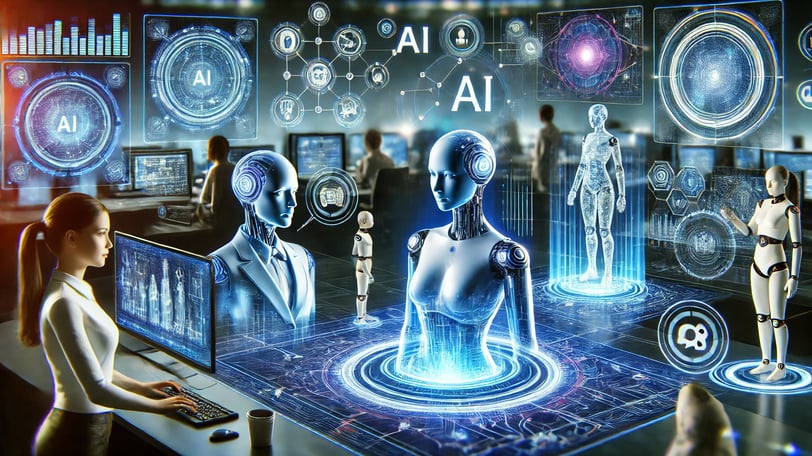What Are AI Agents? Exploring the Basics
Learn about AI agents, their types, applications, and how they work. Discover the benefits and limitations of AI agents in this comprehensive beginner's guide.
AI AGENTS
2/5/20252 min read


What Are AI Agents? Exploring the Basics
Introduction to AI Agents
Imagine having a digital assistant that can not only understand your requests but also take actions to accomplish tasks on your behalf. That's essentially what an AI agent is—a software program powered by artificial intelligence that can perceive its environment, make decisions, and take actions to achieve specific goals.
Understanding AI Agents: The Fundamentals
What Makes Something an AI Agent?
An AI agent has four key characteristics:
Perception: The ability to gather information from its environment
Decision Making: The capability to process information and choose actions
Action: The power to execute chosen tasks
Learning: The ability to improve performance based on experience
Types of AI Agents
Simple Reflex Agents
React to current input without considering history
Follow basic if-then rules
Example: A basic thermostat that turns heating on or off based on current temperature
Model-Based Agents
Maintain an internal model of their environment
Consider how actions affect their world
Example: A self-driving car that creates a map of its surroundings
Goal-Based Agents
Work toward specific objectives
Plan sequences of actions to achieve goals
Example: A chess-playing AI that plans moves to win the game
Learning Agents
Improve performance through experience
Adapt to new situations
Example: A recommendation system that learns user preferences over time
Real-World Applications of AI Agents
In Business
Virtual Assistants: Handling customer service inquiries
Sales Agents: Managing leads and customer relationships
Research Agents: Gathering and analyzing market data
In Personal Use
Smart Home Agents: Managing home automation systems
Personal Productivity Agents: Scheduling meetings and managing emails
Shopping Agents: Finding the best deals online
In Specialized Fields
Medical Diagnosis Agents: Assisting in patient diagnosis
Financial Trading Agents: Making automated trading decisions
Security Agents: Monitoring systems for threats
How AI Agents Work
The Basic Process Flow
Input Processing
Receiving information from sensors or data sources
Converting raw data into usable format
Analysis and Decision Making
Evaluating current situation
Comparing options using algorithms
Selecting optimal actions
Action Execution
Implementing chosen decisions
Monitoring results
Adjusting based on feedback
Key Technologies Behind AI Agents
Machine Learning: For improving performance over time
Natural Language Processing: For understanding human communication
Computer Vision: For processing visual information
Decision Trees: For making logical choices
Neural Networks: For complex pattern recognition
Benefits and Limitations
Advantages
24/7 Operation: Can work continuously without breaks
Consistency: Perform tasks with reliable accuracy
Speed: Process information faster than humans
Scalability: Can handle multiple tasks simultaneously
Limitations
Context Understanding: May struggle with nuanced situations
Creativity: Limited ability for truly creative thinking
Emotional Intelligence: Cannot fully comprehend human emotions
Ethical Decision Making: May need human oversight for complex moral choices
The Future of AI Agents
Emerging Trends
Increased Autonomy: More independent decision-making capabilities
Better Collaboration: Enhanced human-AI interaction
Improved Learning: More sophisticated adaptation abilities
Broader Applications: Expansion into new fields and industries
Potential Developments
Multi-Agent Systems: Teams of AI agents working together
Enhanced Personalization: More tailored responses to individual needs
Improved Natural Interaction: More human-like communication abilities
Getting Started with AI Agents
For Businesses
Identify potential applications
Start with simple, specific tasks
Gradually expand capabilities
Monitor and optimize performance
For Individual Users
Explore available AI assistant tools
Start with basic automation tasks
Learn about customization options
Build comfort with AI interaction
Conclusion
AI agents represent a significant advancement in how we can automate and enhance various tasks and processes. While they have limitations, their potential for improving efficiency and productivity makes them an increasingly important tool in both business and personal contexts.
